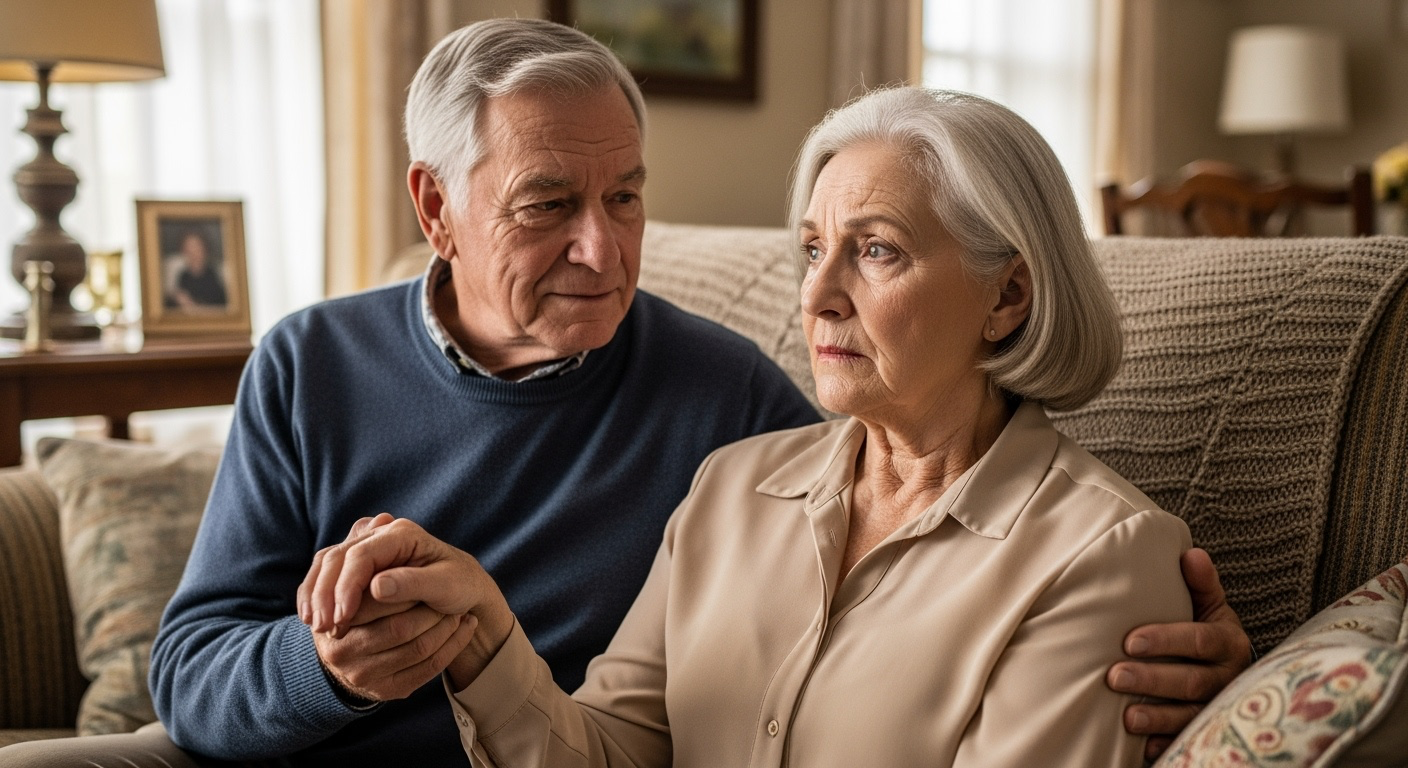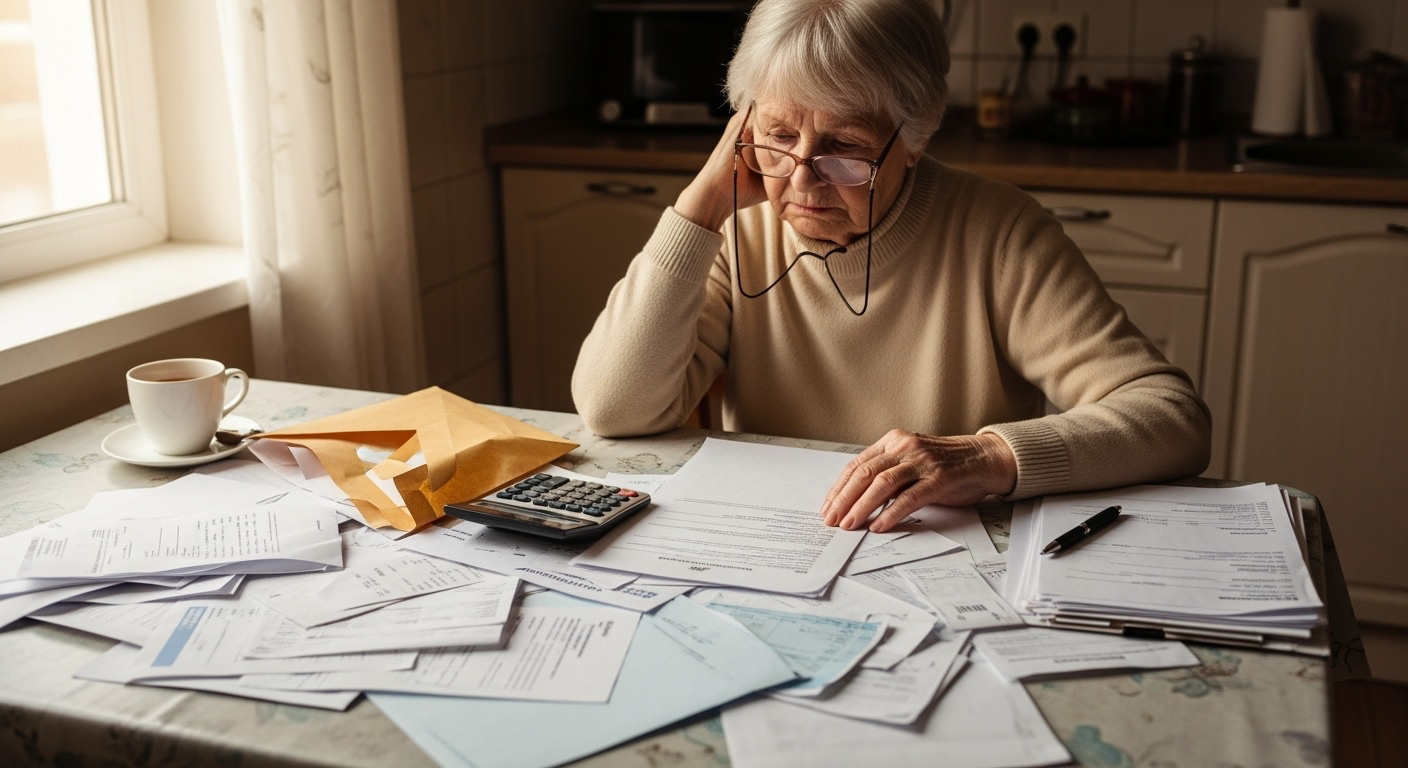The Hidden Fear: How Much Do Retirees Really Worry About Losing Their Spouse?

I'll be honest with you – this isn't the cheeriest topic to write about. But after talking to many retirees over the years and watching my own parents navigate this stage of life, I've realized we need to have this conversation.
There's this unspoken fear that hangs over so many retirement-age couples, and it's not what you might expect. Sure, people worry about money, health care costs, and whether their savings will last. But there's something deeper that keeps many awake at 3 AM: the terrifying thought of losing their spouse.
Maybe you know exactly what I'm talking about. That moment when your partner takes a little longer to answer when you call their name, or when they mention their chest felt tight after climbing the stairs. Suddenly, your mind races to places you don't want it to go.
You're definitely not alone in feeling this way. The numbers are pretty eye-opening when you dig into them.
The Reality Check We All Need
Here's what the data tells us, and it's not sugar-coated: when people become widowed, most of them are retirement age. We're talking about 71% of men and 69% of women who lose their spouse being 65 or older, according to the U.S. Census Bureau's research on love and loss among older adults. That's not a coincidence – it's just the math of getting older together.
What really gets me is the gender gap here. According to the most recent government data, 30% of women ages 65 and older are widows, compared to far fewer men. As the 2023 Profile of Older Americans shows, there are 9 million widows compared to just 2.9 million widowers – more than three times as many. It's not fair, but it's the reality we're dealing with. Women typically outlive their husbands, which means they're more likely to face those final years alone.
And here's the part that really drove this home for me: researchers have documented something called the "widowhood effect." Multiple studies have found that becoming widowed is associated with a 48% increase in risk of mortality. A more recent comprehensive study published in PLOS One analyzed data from nearly one million Danish citizens and found that men face a 70% higher risk of dying within a year, while women face a 27% increase.
Think about that for a minute. It's not just folklore about people dying of broken hearts. It's measurably real.
The Broader Context of Retirement Fears
To understand how spousal loss anxiety fits into retirees' overall concerns, it's important to look at the bigger picture. The 2024 National Institute on Retirement Security survey found some sobering statistics: 79% of Americans agree the nation faces a retirement crisis (up from 67% in 2020), with 55% concerned they cannot achieve financial security in retirement.

Inflation has made these fears worse, with 73% of respondents saying recent inflation has them more concerned about retirement. When you layer the fear of losing a spouse on top of these existing anxieties, the emotional burden becomes overwhelming for many retirees.
The Financial Reality Behind the Fear
It's Not Just About the Emotions
Now, I used to think this was purely an emotional issue. Boy, was I wrong. The financial hit that comes with losing a spouse? It's absolutely brutal.
Recent research shows that over half of widowed women struggle financially after their husband dies. We're talking about women who went from managing their bills just fine to living paycheck to paycheck. That's not because they suddenly started spending recklessly – it's because their income took a nosedive.
The Federal Reserve Bank of Chicago tracked this extensively and found that individual annual income falls by an average of $5,500 after the death of a spouse and remains at this reduced level for at least two years. This translates to a persistent decline of 11% in an individual's annual income.
But that's just the average. I've seen much worse cases.
Take my neighbor, Carol. When her husband died three years ago, their monthly income dropped from $13,500 to $7,500 overnight. That's not a budget adjustment – that's a complete lifestyle overhaul at age 72. His bigger Social Security check stayed, but hers disappeared. Half of his federal pension vanished with him. Just like that, nearly half their income was gone.
Why Nobody Talks About This Stuff
You want to know the really frustrating part? Most couples never plan for this. And I get it – who wants to sit around the kitchen table planning for one of you to die? It feels morbid. It feels like you're jinxing yourselves.
Recent surveys found that 60% of women said their husband's death was unexpected. Unexpected! Even though we all know it's going to happen to one of us eventually. Only about three in ten couples had even bothered to write a will together.
I think part of the problem is that we're sold this vision of retirement as this golden sunset where you both fade away peacefully in your sleep at 95. The reality is messier, scarier, and a lot more practical than that.
The Domino Effect Nobody Warns You About
When a spouse dies, it's not just about missing them emotionally or losing their income. Everything changes, and I mean everything.
First, there's the tax situation. If you've been filing jointly, you're about to get a rude awakening. The standard deduction you're used to? Cut it in half. Carol went from deducting $24,800 to $12,400, which meant more of her already-reduced income got taxed.
Then there's Social Security, which people constantly get wrong. You don't get to keep both checks – that's a myth that needs to die. You get the bigger one, and the smaller one disappears. Period.
Don't even get me started on the daily stuff. Carol's husband handled all their investments and insurance. She'd never logged into their brokerage account in 45 years of marriage. Suddenly, she's supposed to figure out asset allocation and Medicare supplements while she's grieving? It's cruel, really.
The Caregiving Reality
Another thing nobody talks about: the years leading up to loss are often spent caregiving. And caregiving is exhausting.
According to the Administration for Community Living's 2023 report, 37.1 million family caregivers provided unpaid care to someone 65 or older. About one-fourth of family caregivers engage in caregiving activities on any given day, and those 65 and older spend an average of 4.9 hours providing care on the days they help.
So you're already worn down from taking care of your spouse, worried sick about losing them, and then when it happens, you're supposed to somehow navigate all the financial and practical chaos that follows? The system is set up to break people.
What Actually Helps (And What Doesn't)
Essential Planning Steps
Okay, enough doom and gloom. Let me tell you what I've learned from people who've handled this well.
First, you've got to have the conversations now, while you're both healthy and thinking clearly. I know it's uncomfortable, but comfortable conversations don't save marriages from financial disaster.
Both of you need to know where everything is – bank accounts, insurance policies, investment accounts, passwords, the works. I can't tell you how many widows I've met who spent months just trying to figure out what assets they had.
Get your legal stuff sorted out. Not just wills – powers of attorney, healthcare directives, beneficiary designations on every single account. And review this stuff regularly. Life changes, and your paperwork should change with it.
Consider life insurance, especially if there's a big gap between your incomes or if one person's pension doesn't have survivor benefits. It's not fun to think about, but it's practical.
Professional Guidance Required

The Support You Actually Need
When the time comes – and for most couples, it will – the surviving spouse needs real support, not just casseroles and sympathy cards.
The research shows that friends actually provide better emotional support than family members during grief. Family relationships are complicated. Friends choose to be in your life, and that choice feels different when you're hurting.
There are support groups specifically for this situation. Many churches and community centers offer grief support programs. Some people roll their eyes at the idea, but I've seen it work. Having other people who understand what you're going through makes a difference.
Getting Professional Help
Here's something that surprised me: most widows fire their financial advisor within the first year. Think about that. At the most vulnerable time in their financial lives, they're getting rid of their professional help.
Usually, it's because the advisor only worked with the husband, or the widow feels ignored or talked down to. This is why both spouses need to be involved in choosing and working with financial professionals from the start.
You need a team – a financial advisor who gets retirement transitions, an estate attorney who's not stuck in 1995, and honestly, a therapist who specializes in grief and aging. This isn't DIY territory.
Making Peace With an Imperfect Situation
Look, I'm not going to lie to you and say there's a way to make this painless. Losing your life partner is going to hurt, no matter how well you plan for it. The financial disruption is going to be significant for most people.
But what I've learned from watching people go through this is that preparation makes a huge difference. Not just financially, but emotionally. When you know you've done everything you can to protect each other, there's a peace that comes with that.
Carol, my neighbor I mentioned earlier? She's doing okay now, three years later. The first year was hell – she'll tell you that herself. But she and her husband had talked through most of this stuff before he got sick. She knew what to expect financially. She had the right legal documents. She kept up with her friends throughout his illness instead of disappearing.
It didn't make losing him easy, but it made the aftermath manageable.

The Bottom Line
Planning for spousal loss isn't about being pessimistic or morbid. It's about being realistic and loving. If you really love someone, you want to make sure they'll be okay if something happens to you.
The statistics are clear: most of us are going to face this. The widow or widower years are a real stage of life that deserves as much planning and preparation as any other.
Your retirement should be about enjoying each other and the life you've built together. But part of that enjoyment comes from knowing you've got each other's backs, even when one of you isn't there anymore.
Start having these conversations. Get your ducks in a row. Build your support network now, while you don't need it yet. Because when you do need it, you'll be grateful you did the work ahead of time.
And remember – every day you have together is a gift. Don't waste it worrying about tomorrow. But don't ignore tomorrow either.
Where to Learn More: Research and Resources
If you want to dig deeper into this topic, here are some valuable resources that provide the scientific foundation for understanding spousal loss in retirement. I've included links to the free resources I could verify are working.
Government Research and Data
The National Institute on Retirement Security's comprehensive 2024 study reveals that 79% of Americans agree the nation faces a retirement crisis, with detailed breakdowns of retirement fears including financial concerns that compound spousal loss anxiety.
For demographic trends on widowhood, the U.S. Census Bureau's analysis of love and loss among older adults provides official statistics on widowhood patterns and age distributions.
The Administration for Community Living's 2023 Profile of Older Americans offers comprehensive data on widowhood statistics, showing that widows account for 29% of all older women (9 million people) compared to 2.9 million widowers.
The Federal Reserve Bank of Chicago's research on financial life after spousal death offers detailed analysis of income changes and financial impacts, documenting the $5,500 average annual income decline.
Academic and Medical Research
For those interested in the scientific evidence behind the widowhood effect, this comprehensive PLOS One study analyzed nearly one million Danish citizens and documented the increased mortality risks by gender. The full study is freely available online.
Research consistently shows that becoming widowed is associated with a 48% increase in mortality risk, as documented in multiple peer-reviewed studies available through medical databases.
Industry Resources
AARP's research division produces extensive studies on aging issues, including financial security for widows and caregiving trends. Many reports are freely downloadable.
The Employee Benefit Research Institute (EBRI) publishes regular reports on retirement security and preparedness, including analysis of spousal benefit issues. Their research briefs are available free online.
Key Findings Summary
The research consistently shows:
- 71% of men and 69% of women who become widowed are 65 or older
- 30% of women ages 65+ are widows vs. far fewer men (latest government data)
- 48% increase in mortality risk after becoming widowed
- $5,500 average annual income decline after spousal death
- 79% of Americans agree the nation faces a retirement crisis
- 73% are more concerned about retirement due to inflation
These statistics underscore why spousal loss anxiety is not only common but rational among retirees. While the fear is justified, proper planning with qualified professionals can significantly reduce both the financial and emotional impact when the time comes.



